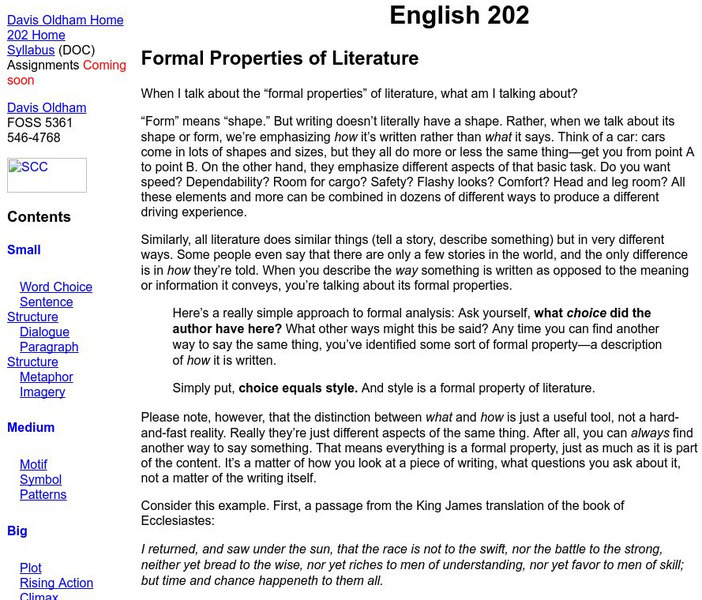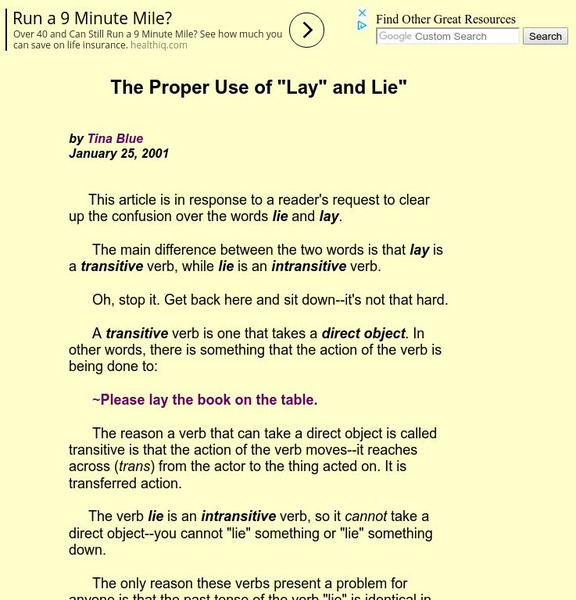Curated OER
Redistricting: Drawing the Lines
Difficult redistricting concepts are covered in a context that will make it understandable to your government scholars. They begin with a KWL on the term redistricting and then watch a video to answer some questions. They...
Curated OER
The Internet of Things: IoT
How has the Internet of Things affected our lives? Scholars examine the massive influence of mobile devices in this analysis lesson, which begins with a seven-minute documentary clip. They also read a New York Times article (linked)...
California Department of Education
Writing Right
Prepare high school seniors for the job search process with a lesson that teaches them how to craft four different types of business letters: the cover letter, the informational interview request, a reference request, and a thank you...
California Department of Education
Etiquette? What’s That?
Business etiquette is a big deal! Are your scholars prepared to impress in the business world? The third in a series of six college and career readiness lessons focuses on basic behaviors in business situations. Groups research specific...
California Department of Education
Writing Right
Does your class have the write stuff? Young career seekers try their hand at composing business letters in the second of six career and college readiness lesson plans for seniors. Pupils practice writing cover letters, thank you notes,...
California Department of Education
My Best Resume
For employers and recruiters, the first step in their quest to find good candidates is the paper screening process. They look at a candidate's application and resume and push forward the files of those who meet their requirements. Thus...
National Endowment for the Humanities
The New Order for "Greater East Asia"
Sometimes the New Order becomes synonymous with its implications for European countries, but what about its consequences for East Asia? The final instructional activity in a four-part series teaches scholars about World War II. High...
National Endowment for the Humanities
Victory and the New Order in Europe
A New Order in Europe calls for a new lesson plan! This third plan in a series of four sequential lessons encourages high schoolers to read primary sources about the development of the New Order and follow up their knowledge with a...
National Endowment for the Humanities
How to Win a World War
High schoolers are have begun to learn the art of diplomacy with each other, but do they understand how diplomacy works at a global level? The second in a series of four lessons, guides scholars in evaluating primary sources....
National Endowment for the Humanities
How "Grand" and "Allied" Was the Grand Alliance?
Learn more about the Grand Alliance with a scaffolded lesson plan that includes four activities. Class members use primary sources to complete a map exercise, understand the goals and objectives of each individual nation, and participate...
Curated OER
Constructing Narrative from the Migrant Experience in Literature
Excerpts from John Steinbeck's The Grapes of Wrath and from John Fante's Ask the Dust, as well as a variety of primary source documents provide the background for an examination of the migrant experience from 1920-1945.
TV411
Dependent and Independent Clauses Join Forces
Young grammarians are often confused by clauses, especially the difference between dependent and independent clauses. Clarify the confusion with a color-coded worksheet that clearly defines and illustrates the differences and then gives...
Southern Nevada Regional Professional Development Program
Pardon Me, Your Modifier is Dangling
Lost! (or misplaced) a modifier. Last seen dangling at the end of a sentence! Reward offered! To underscore the humor, class members are each given a sample sentence to illustrate (A woman passed by, leading a Springer Spaniel, in a...
Curated OER
Words In The News
A complete resource from BBC World Service provides informational text for English or ESL classes to teach vocabulary, grammar, and reading skills. Learners participate in small group work, whole class discussions, and role-plays to...
Curated OER
Looking North Of The Greek World: The Slavic Folk Poetry of The Balkans
Showing how folk poetry keeps alive national heritage is the stated goal of this proposal for a unit on the poetry of the Balkans.
Shmoop
ELA.CCSS.ELA-Literacy.L.11-12.1
Despite English grammar rules, in the e-world the plural of mouse is mouses. lol. Standard American English is constantly evolving. Introduce your class members to a variety of terms that describe different usage changes (economy,...
Curated OER
Active and Passive Voice: Finding Examples Online
Incorporate technological fluency with a search for examples of active and passive voice in online resources. Discuss how use of active or passive voice influences mood or tone and contributes to author's purpose. List of...
National Endowment for the Humanities
Charles Baudelaire: Poète Maudit (The Cursed Poet)
After learning the main ideas of the Decadent movement, students work in small groups to read and translate poems by the French poet Charles Baudelaire using basic etymology skills. They then read the accurate English translations to see...
Georgia Department of Education
Ga Virtual Learning: Subject and Verb Agreement Rules [Pdf]
This is a four-page PDF of subject and verb agreement rules with examples.
Capital Community College Foundation
Guide to Grammar and Writing: Quiz on Subject Verb Agreement
This is a self-grading quiz on subject-verb agreement. Students read an article with boxes after punctuation marks, and decide if the mark should be removed.
Ted Nellen
Cyber English (By Ted Nellen): Alliteration
This site fully explores the term "alliteration." Content includes a definition, examples in literature, and a look at why and how it has been used throughout literary history.
Other
Shoreline Community College: Formal Properties of Literature
As students become more aware of text complexity, an understanding of the formal properties of literature becomes more important. This is an excellent examination of the kinds of choices writers make that change the way readers receive...
Grammarly
Grammarly Blog: Anytime vs. Any Time
This page focuses on changes in language usage pertaining to "anytime" and "any time." In informal writing "anytime" can be used, but in formal writing "any time" is perferable. Examples are provided.
Grammar Tips
Grammar Tips: The Proper Use of "Lay" and "Lie"
Check this brief explanation of how to tell the difference between lay, a transitive verb, and lie an intransitive verb, and use them properly in English grammar.




















![Ga Virtual Learning: Subject and Verb Agreement Rules [Pdf] Handout Ga Virtual Learning: Subject and Verb Agreement Rules [Pdf] Handout](https://static.lp.lexp.cloud/images/attachment_defaults/resource/large/FPO-knovation.png)



